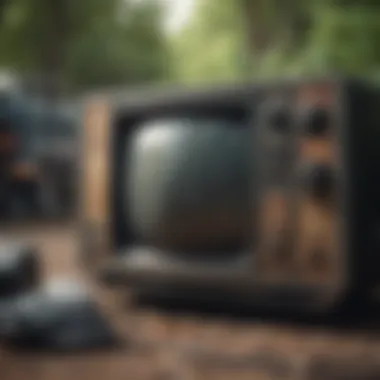A Comprehensive Guide to Properly Dispose of Old TVs and Computers: Environmental Solutions


Overview of the Topic
The issue of properly disposing of old TVs and computers is a critical aspect of environmental responsibility in today's technologically driven society. With the rapid pace of technological advancement, electronic devices quickly become obsolete, leading to a surge in electronic waste or e-waste. This e-waste poses a significant environmental threat due to the toxic materials it contains, such as lead, mercury, and cadmium. As such, understanding how to dispose of old TVs and computers is paramount to mitigating the environmental impact of e-waste.
Current State and Challenges
The current state of electronic waste management presents numerous challenges and threats to environmental sustainability. Improper disposal of old TVs and computers results in these devices ending up in landfills, where their toxic components can leach into the soil and water, contaminating the ecosystem. Furthermore, the improper handling of e-waste can also lead to health hazards for individuals involved in the disposal process. Addressing these challenges requires a concerted effort to raise awareness about the proper disposal methods for electronic devices.
Sustainable Solutions
To tackle the challenges posed by e-waste, sustainable solutions for disposing of old TVs and computers are essential. Recycling electronic devices is a key sustainable practice that helps recover valuable materials while reducing the demand for new resources. Additionally, refurbishing old devices and donating them to community organizations or schools can extend their lifespan and minimize electronic waste generation. Partnering with certified e-waste recyclers and participating in electronic take-back programs are effective ways to ensure that old devices are disposed of responsibly.
Impact and Importance
The impact of improper disposal of old TVs and computers extends beyond environmental concerns and significantly affects ecosystems, communities, and future generations. E-waste pollution poses risks to wildlife, soil quality, and human health, emphasizing the urgency of proper disposal practices. Conservation efforts and sustainable resource use in electronic waste management play a crucial role in safeguarding our environment and promoting a more sustainable future. It is imperative to recognize the importance of responsible electronics disposal in preserving natural resources and protecting the well-being of present and future generations.
Understanding E-Waste
E-Waste, an acronym for electronic waste, is a pressing environmental issue that demands immediate attention in the digital age. In this article, delving into the nuances of Understanding E-Waste is paramount for individuals seeking to responsibly dispose of their old TVs and computers. Understanding E-Waste involves comprehending the detrimental impact discarded electronics have on the environment and human health. By grasping the lifecycle of electronic devices and the hazards they pose when not disposed of properly, individuals can make informed choices to mitigate the environmental consequences of electronic waste. This section will explore key facets such as the categorization of e-waste, its global proliferation, and the necessity of adopting sustainable practices to address this growing concern.
Definition of E-Waste


E-Waste encompasses any discarded electronic devices or equipment, ranging from old televisions and computers to mobile phones and kitchen appliances. These items contain a multitude of hazardous materials such as lead, mercury, and cadmium, which can leach into the soil and water sources, posing severe risks to ecosystems and human health. Understanding the Definition of E-Waste underscores the necessity of recognizing electronic products' composition and their potential environmental impact. Proper classification of e-waste aids in implementing effective disposal strategies and promoting eco-conscious behaviors among consumers, thereby reducing the harmful effects of electronic waste on our planet.
Environmental Impact of Improper Disposal
Improper Disposal of electronic devices leads to dire environmental consequences, including soil and water contamination, air pollution, and resource depletion. When old TVs and computers are carelessly discarded in landfills or incinerated, toxic substances seep into the earth, contaminating ecosystems and endangering wildlife. Understanding the Environmental Impact of Improper Disposal elucidates the urgency of adopting sustainable waste management practices to curtail pollution and preserve natural resources. By exploring the effects of e-waste on biodiversity, air quality, and climate change, individuals can appreciate the significance of responsible electronic disposal in safeguarding environmental integrity.
Legislation and E-Waste Management
Legislation and E-Waste Management play pivotal roles in regulating the disposal and recycling of electronic waste at local, national, and international levels. Governments worldwide have enacted laws and policies to monitor e-waste handling, promote recycling initiatives, and hold producers accountable for their products' end-of-life management. Understanding the legal frameworks and E-Waste Management practices in place is essential for fostering a circular economy and achieving sustainable resource use. Compliance with e-waste regulations not only mitigates environmental contamination but also encourages innovation in waste reduction and resource recovery, propelling the transition towards a greener and more efficient electronics industry.
Disposing of Old TVs
In this comprehensive guide on how to dispose of old TVs and computers, the section focusing on Disposing of Old TVs is crucial. Addressing the environmental impact of electronic waste, this segment delves into specific methods and considerations for responsibly getting rid of old televisions. E-waste poses a significant threat to the environment, making proper disposal imperative. By highlighting the key points in the disposal process, individuals can contribute to minimizing the impact of e-waste on our planet.
Donating Working TVs
When it comes to disposing of old TVs, donating working televisions plays a vital role. This practice not only diverts electronic waste from landfills but also provides functional devices to those in need. By extending the lifespan of these TVs through donations, individuals can contribute to a more sustainable approach to electronic disposal. Organizations and charities often accept such donations, ensuring that the TVs are put to good use and benefitting others.
Recycling Non-Functional TVs
For non-functional TVs, recycling is a key practice in responsible electronic waste management. Recycling centers specialize in dismantling electronic devices, ensuring that valuable materials are extracted and reused. Components like metals, plastics, and glass can be recycled, reducing the need for raw materials and easing the strain on natural resources. Proper recycling of non-functional TVs prevents hazardous materials from contaminating the environment, making it a critical step in sustainable e-waste disposal.


Trade-In Programs with Manufacturers
Trade-in programs with manufacturers offer another avenue for disposing of old TVs sustainably. Many electronics companies provide trade-in options for outdated or malfunctioning devices. By trading in old TVs, individuals can access discounts on new purchases while ensuring that the manufacturer disposes of the old TVs in an environmentally friendly manner. These programs facilitate the proper handling and recycling of electronic waste, encouraging a circular economy approach to TV disposal.
Disposing of Old Computers
In this section, we delve into the crucial aspects of disposing of old computers, shedding light on the significance of responsible electronic waste management. As technology progresses at a rapid pace, rendering older computers obsolete is a common occurrence, necessitating the proper disposal of these devices to minimize environmental impact. The disposal of old computers plays a pivotal role in combating the growing concern of e-waste accumulation worldwide.
Wiping Data Before Disposal
Before parting ways with your old computer, it is imperative to prioritize data security by wiping all personal and sensitive information from the device. This process involves thoroughly erasing data to prevent potential privacy breaches and identity theft. Whether choosing to recycle, donate, or sell your computer, ensuring data wipe is essential for safeguarding your personal information. Utilizing data wiping software or seeking professional assistance can aid in meticulously removing all traces of data, safeguarding your privacy and preventing unauthorized access.
Recycling Computer Components
The recycling of computer components is a sustainable practice that extends the lifespan of electronic devices while reducing the harmful impact of e-waste on the environment. Discarded computer components contain valuable materials such as metals, plastics, and glass that can be salvaged and repurposed through recycling processes. By dismantling old computers and extracting reusable materials, recycling not only conserves natural resources but also minimizes the energy consumption associated with manufacturing new components. Choosing certified e-waste recyclers ensures responsible handling of hazardous materials present in computers, further contributing to environmental protection and sustainability.
Donating to Schools or Non-Profit Organizations
Donating old computers to schools or non-profit organizations presents an opportunity to give back to the community while promoting digital inclusion and education. Many educational institutions and charitable organizations welcome donations of functional computers to support learning initiatives and bridge the digital divide. By extending the lifecycle of old computers through donation, individuals can make a meaningful impact by providing access to technology for underserved communities. Additionally, collaborating with non-profit organizations ensures that donated devices are refurbished, repurposed, and distributed ethically, aligning with philanthropic values and environmental stewardship.
Eco-Friendly Alternatives to Disposal


In this crucial section of the guide dedicated to the disposal of old TVs and computers, we delve into the essence of Eco-Friendly Alternatives to Disposal, emphasizing the pivotal role these practices play in the overarching goal of sustainable electronic waste management. As the global electronic waste crisis intensifies, exploring environmentally conscious solutions becomes imperative. Eco-Friendly Alternatives to Disposal serve as a beacon of hope amidst the mounting e-waste dilemma, offering a multitude of avenues through which individuals can contribute to a greener, healthier planet. By spotlighting these alternatives, we aim to equip our readers with the knowledge and tools necessary to make ethically sound decisions concerning the disposal of their electronic devices.
Upcycling Old Electronics
This section casts a spotlight on the art of Upcycling Old Electronics, a practice that champions creativity and resourcefulness in extending the lifespan of electronic gadgets. Delving deep into the realm of upcycling, we uncover the transformative power of giving old electronics a new lease on life. By repurposing and reinventing outdated gadgets, individuals not only mitigate the environmental impact of electronic waste but also unleash their innovative flair. Exploring various upcycling techniques and inspirational projects, this segment aims to ignite a spark of ingenuity in our readers, encouraging them to view 'old' electronics through a fresh, eco-conscious lens.
Repairing and Refurbishing Electronics
The narrative now pivots towards Repairing and Refurbishing Electronics, an ethos rooted in sustainability and responsible consumption. Here, we unravel the art of breatherepairing and revitalizing electronic devices, emphasizing the economic and environmental benefits of opting for repair over replacement. In a world dominated by throwaway culture, understanding the importance of repairing electronics is paramount. Through practical tips, repair guides, and success stories, this section serves as a guiding light for individuals looking to embrace a more sustainable approach to electronics ownership.
Utilizing Electronic Waste Recycling Centers
Lastly, we scrutinize the significance of Utilizing Electronic Waste Recycling Centers in the landscape of e-waste management. These specialized facilities play a pivotal role in diverti(shortened).waste from landfills, nurturing a circular economy where valuable resources are reclaimed and reused. By shedding light on the operations and benefits of electronic waste recycling centers, we empower our readers to make informed decisions when it comes to discarding their old TVs and computers responsibly. Join us in exploring the inner workings of these recycling hubs and discover the transformative impact they have on the sustainability of our planet.
Conclusion
In the realm of responsible electronic waste disposal, the detailed guide on how to dispose of old TVs and computers culminates in the significant need for awareness and action. The contemporary issues surrounding e-waste management necessitate a proactive approach from individuals, organizations, and policymakers to mitigate the environmental impact of electronic devices at the end of their lifecycle.
By delving into the intricacies of e-waste disposal methods ranging from donating functional devices to recycling non-functional ones, the guide emphasizes a holistic perspective on sustainable practices. It underscores the crucial role of individuals in minimizing e-waste proliferation, a crucial aspect to consider in the era of digital advancements.
Furthermore, the guide accentuates the importance of data security in the disposal of old computers, shedding light on the significance of wiping data before recycling or donating. In a digital age marked by heightened privacy concerns, safeguarding personal and confidential information prior to disposing of electronic devices is indispensable.
Moreover, the narrative explores eco-friendly alternatives to disposal such as upcycling electronics, emphasizing the value of creativity and innovation in repurposing old gadgets. By fostering a culture of repair and refurbishment, individuals can contribute to sustainable consumption patterns and reduce the strain on natural resources.
The notion of engaging with electronic waste recycling centers emerges as a pivotal solution, promoting a circular economy model that minimizes waste generation and maximizes resource efficiency. Through collaboration with such centers, individuals can partake in a collective effort towards sustainable e-waste management.
In essence, the overarching theme of the guide advocates for conscious consumer behavior, informed decision-making, and ecological responsibility in the disposal of old TVs and computers. It serves as a compass for navigating the complexities of e-waste management, offering practical insights and actionable steps towards a more sustainable and environmentally conscious future.



